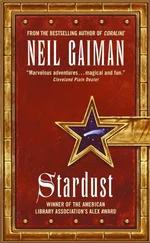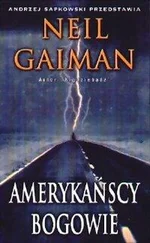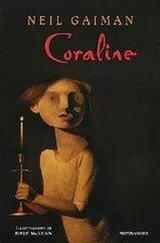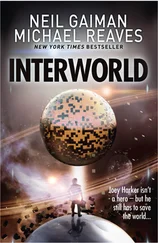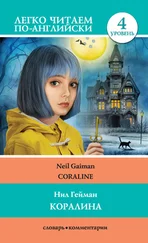Coraline - Neil Gaiman
Здесь есть возможность читать онлайн «Coraline - Neil Gaiman» весь текст электронной книги совершенно бесплатно (целиком полную версию без сокращений). В некоторых случаях можно слушать аудио, скачать через торрент в формате fb2 и присутствует краткое содержание. Жанр: на английском языке. Описание произведения, (предисловие) а так же отзывы посетителей доступны на портале библиотеки ЛибКат.
- Название:Neil Gaiman
- Автор:
- Жанр:
- Год:неизвестен
- ISBN:нет данных
- Рейтинг книги:5 / 5. Голосов: 12
-
Избранное:Добавить в избранное
- Отзывы:
-
Ваша оценка:
- 100
- 1
- 2
- 3
- 4
- 5
Neil Gaiman: краткое содержание, описание и аннотация
Предлагаем к чтению аннотацию, описание, краткое содержание или предисловие (зависит от того, что написал сам автор книги «Neil Gaiman»). Если вы не нашли необходимую информацию о книге — напишите в комментариях, мы постараемся отыскать её.
Neil Gaiman — читать онлайн бесплатно полную книгу (весь текст) целиком
Ниже представлен текст книги, разбитый по страницам. Система сохранения места последней прочитанной страницы, позволяет с удобством читать онлайн бесплатно книгу «Neil Gaiman», без необходимости каждый раз заново искать на чём Вы остановились. Поставьте закладку, и сможете в любой момент перейти на страницу, на которой закончили чтение.
Интервал:
Закладка:
Coraline
Neil Gaiman
I started this for Holly
I finsished it for Maddy
Fairy tales are more than true: not because they tell us that dragons exist,
but because they tell us that dragons can be beaten.
-G. K. Chesterton
1
CORALINE DISCOVERED THE DOOR a little while after they moved into the house.
It was a very old house-it had an attic under the roof and a cellar under the ground and an overgrown garden with huge old trees in it.
Coraline's family didn't own all of the house-it was too big for that. Instead they owned part of it.
There were other people who lived in the old house.
Miss Spink and Miss Forcible lived in the flat below Coraline's, on the ground floor. They were both old and round, and they lived in their flat with a number of ageing Highland terriers who had names like Hamish and Andrew and Jock. Once upon a time Miss Spink and Miss Forcible had been actresses, as Miss Spink told Coraline the first time she met her.
"You see, Caroline," Miss Spink said, getting Coraline's name wrong, "both myself and Miss Forcible were famous actresses, in our time. We trod the boards, luvvy. Oh, don't let Hamish eat the fruitcake, or he'll be up all night with his tummy."
"It's Coraline. Not Caroline. Coraline," said Coraline.
In the flat above Coraline's, under the roof, was a crazy old man with a big moustache. He told Coraline that he was training a mouse circus. He wouldn't let anyone see it.
"One day, little Caroline, when they are all ready, everyone in the whole world will see the wonders of my mouse circus. You ask me why you cannot see it now. Is that what you asked me?"
"No," said Coraline quietly, "I asked you not to call me Caroline. It's Coraline."
"The reason you cannot see the mouse circus," said the man upstairs, "is that the mice are not yet ready and rehearsed. Also, they refuse to play the songs I have written for them. All the songs I have written for the mice to play go oompah oompah . But the white mice will only play toodle oodle , like that. I am thinking of trying them on different types of cheese."
Coraline didn't think there really was a mouse circus. She thought the old man was probably making it up.
The day after they moved in, Coraline went exploring.
She explored the garden. It was a big garden: at the very back was an old tennis court, but no-one in the house played tennis and the fence around the court had holes in it and the net had mostly rotted away; there was an old rose garden, filled with stunted, flyblown rose-bushes; there was a rockery that was all rocks; there was a fairy ring, made of squidgy brown toadstools which smelled dreadful if you accidentally trod on them.
There was also a well. Miss Spink and Miss Forcible made a point of telling Coraline how dangerous the well was, on the first day Coraline's family moved in, and warned her to be sure she kept away from it. So Coraline set off to explore for it, so that she knew where it was, to keep away from it properly.
She found it on the third day, in an overgrown meadow beside the tennis court, behind a clump of trees-a low brick circle almost hidden in the high grass. The well had been covered up by wooden boards, to stop anyone falling in. There was a small knot-hole in one of the boards, and Coraline spent an afternoon dropping pebbles and acorns through the hole, and waiting, and counting, until she heard the plop as they hit the water, far below.
Coraline also explored for animals. She found a hedgehog, and a snake-skin (but no snake), and a rock that looked just like a frog, and a toad that looked just like a rock.
There was also a haughty black cat, who would sit on walls and tree stumps, and watch her; but would slip away if ever she went over to try to play with it.
That was how she spent her first two weeks in the house-exploring the garden and the grounds.
Her mother made her come back inside for dinner, and for lunch; and Coraline had to make sure she dressed up warm before she went out, for it was a very cold summer that year; but go out she did, exploring, every day until the day it rained, when Coraline had to stay inside.
"What should I do?" asked Coraline.
"Read a book," said her mother. "Watch a video. Play with your toys. Go and pester Miss Spink or Miss Forcible, or the crazy old man upstairs."
"No," said Coraline. "I don't want to do those things. I want to explore."
"I don't really mind what you do," said Coraline's mother, "as long as you don't make a mess."
Coraline went over to the window and watched the rain come down. It wasn't the kind of rain you could go out in, it was the other kind, the kind that threw itself down from the sky and splashed where it landed. It was rain that meant business, and currently its business was turning the garden into a muddy, wet soup.
Coraline had watched all the videos. She was bored with her toys, and she'd read all her books.
She turned on the television. She went from channel to channel to channel, but there was nothing on but men in suits talking about the stock market, and schools programmes. Eventually, she found something to watch: it was the last half of a natural history programme about something called protective coloration. She watched animals, birds and insects which disguised themselves as leaves or twigs or other animals to escape from things that could hurt them. She enjoyed it, but it ended too soon, and was followed by a programme about a cake factory.
It was time to talk to her father.
Coraline's father was home. Both of her parents worked, doing things on computers, which meant that they were home a lot of the time. Each of them had their own study.
"Hello, Coraline," he said when she came in, without turning round.
"Mmph," said Coraline. "It's raining."
"Yup," said her father. "It's bucketing down."
"No," said Coraline, "it's just raining. Can I go outside?"
"What does your mother say?"
"She says, 'You're not going out in weather like that, Coraline Jones'."
"Then, no."
"But I want to carry on exploring."
"Then explore the flat," suggested her father. "Look-here's a piece of paper and a pen. Count all the doors and windows. List everything blue. Mount an expedition to discover the hot-water tank. And leave me alone to work."
"Can I go into the drawing room?" The drawing room was where the Joneses kept the expensive (and uncomfortable) furniture Coraline's grandmother had left them when she died. Coraline wasn't allowed in there. Nobody went in there. It was only for best.
"If you don't make a mess. And you don't touch anything."
Coraline considered this carefully, then she took the paper and pen and went off to explore the inside of the flat.
She discovered the hot-water tank (it was in a cupboard in the kitchen).
She counted everything blue (153).
She counted the windows (21).
She counted the doors (14).
Of the doors that she found, thirteen opened and closed. The other, the big, carved, brown wooden door at the far corner of the drawing room, was locked.
She said to her mother, "Where does that door go?"
"Nowhere, dear."
"It has to go somewhere."
Her mother shook her head. "Look," she told Coraline.
She reached up, and took a string of keys from the top of the kitchen doorframe. She sorted through them carefully and selected the oldest, biggest, blackest, rustiest key. They went into the drawing room. She unlocked the door with the key.
The door swung open.
Her mother was right. The door didn't go anywhere. It opened on to a brick wall.
"When this place was just one house," said Coraline's mother, "that door went somewhere. When they turned the house into flats, they simply bricked it up. The other side is the empty flat on the other side of the house, the one that's still for sale."
Читать дальшеИнтервал:
Закладка:
Похожие книги на «Neil Gaiman»
Представляем Вашему вниманию похожие книги на «Neil Gaiman» списком для выбора. Мы отобрали схожую по названию и смыслу литературу в надежде предоставить читателям больше вариантов отыскать новые, интересные, ещё непрочитанные произведения.
Обсуждение, отзывы о книге «Neil Gaiman» и просто собственные мнения читателей. Оставьте ваши комментарии, напишите, что Вы думаете о произведении, его смысле или главных героях. Укажите что конкретно понравилось, а что нет, и почему Вы так считаете.

